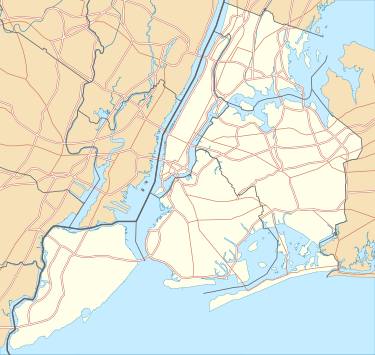Lorillard Snuff Mill
Lorillard Snuff Mill | |
New York City Landmark No. 0121
| |
 Lorillard Snuff Mill in 2011 | |
| Location | Snuff Mill Road, New York Botanical Garden, Bronx, New York |
|---|---|
| Coordinates | 40°51′35″N 73°52′34″W / 40.859681°N 73.876174°W |
| Area | 5 acres (2.0 ha) |
| Built | 1840 |
| Architect | P. Lorillard Co. |
| Part of | New York Botanical Garden (ID67000009) |
| NRHP reference No. | 77000935[1] |
| NYSRHP No. | 00501.000001 |
| NYCL No. | 0121 |
| Significant dates | |
| Added to NRHP | December 22, 1977[1] |
| Designated NHL | December 22, 1977[2] |
| Designated CP | May 28, 1967 |
| Designated NYSRHP | June 23, 1980 |
| Designated NYCL | April 19, 1966 |
The Lorillard Snuff Mill now known as the Lillian and Amy Goldman Stone Mill, is the oldest existing tobacco manufacturing building in the United States. It was built around 1840 next to the Bronx River to supplement an earlier building of the same function. The schist rock that makes up its walls was quarried locally. It was declared a National Historic Landmark in 1977. It is located inside the New York Botanical Garden, itself an NHL.[2][3]
History
[edit]
The Lorillard firm was founded by Pierre Abraham Lorillard in 1760. His two sons, Peter and George, took over after he was killed during the American Revolutionary War, and they moved the manufacturing portion of the business to this location in the Bronx in 1792.[3]
Peter Lorillard III built a forty-five room mansion, stone cottage and stables nearby. The mansion burned in 1923. The Lorillard company and family left the property in the Bronx in 1870 after relocating their business to Jersey City, NJ. The land was purchased by the New York City government in 1884 and was transferred to the New York Botanical Garden in 1915.[4][5]
The Mill was retained by New York City Department of Parks and Recreation and used for storage and shops. In 1937 it was transferred to the Botanical Garden along with several other small parcels. The Mill was renovated in 1952-54. A cafe and patio were installed on the lower side facing the Bronx River, and a meeting room was fashioned from the space that once held snuff-grinding equipment. The building had a $10.5 million restoration in 2010. It is now used for staff offices and a catering facility.[4][5]
See also
[edit]- List of New York City Designated Landmarks in The Bronx
- National Register of Historic Places in Bronx County, New York
References
[edit]- ^ a b "National Register Information System". National Register of Historic Places. National Park Service. January 23, 2007.
- ^ a b "Lorillard Snuff Mill". National Historic Landmark summary listing. National Park Service. September 15, 2007. Archived from the original on June 5, 2011.
- ^ a b George R. Adams (December 1976). "National Register of Historic Places Inventory-Nomination: Lorillard Snuff Mill" (pdf). National Park Service.
{{cite journal}}: Cite journal requires|journal=(help) and Accompanying photos, exterior, from 1976 and c.1902. (1.90 MB) - ^ a b Kirsch, Abigail. "The Snuff Mill Gallery". Abigail Kirsch. Archived from the original on May 17, 2011. Retrieved August 7, 2010.
- ^ a b Dunlap, David W. (February 9, 2009). "From Tobacco Leaves to Wedding Bouquets, 169 Years in the Bronx". February 8, 2009. New York Times. Retrieved April 7, 2012.
External links
[edit]- New York Botanical Garden
- Abigail Kirsch description including photos and floor plans
- Historic American Buildings Survey (HABS) No. NY-462, "Lorillard Snuff Mill, Botanical Gardens, Bronx Park, Bronx, Bronx County, NY", 2 photos, 4 measured drawings, 1 photo caption page, supplemental material
- NHL application describing the history of the building
- NYC application of historic preservation Archived December 2, 2021, at the Wayback Machine
- Historic district contributing properties in New York City
- Industrial buildings and structures on the National Register of Historic Places in New York City
- Industrial buildings completed in 1840
- National Historic Landmarks in New York City
- Historic American Buildings Survey in New York City
- Industrial buildings and structures in New York (state)
- Buildings and structures in the Bronx
- New York City Designated Landmarks in the Bronx
- New York Botanical Garden
- Lorillard Tobacco Company
- Tobacco buildings in the United States
- National Register of Historic Places in the Bronx
- 1840 establishments in New York (state)
- New York State Register of Historic Places in Bronx County



